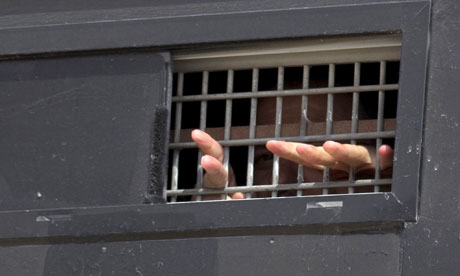
A Palestinian delegation is set to visit Cairo in the coming days to discuss the treatment and imprisonment of Palestinians at the hands of Israel. Heading the delegation is Issa Qaraqe, the Palestinian Authority minister for prisoner’s affairs.
According to the state-run MENA news agency, the PA is looking at Egypt to once again mediate a prisoner release. The delegation is specifically concerned with Samer Al-Issawi and Ayman Cherauna, two prisoners who began an extended hunger-strike in 2012 and garnered considerable social media attention.
PA President Mahmoud Abbas also gave instructions to the delegation to discuss the re-arrest of several Palestinians freed as part of a prisoner swap in 2011. At the time Egypt brokered a prisoner swap which saw over 1,000 Palestinians released in Exchange for Gilad Shalit, an Israeli army corporal captured in 2006 by Hamas during an attack on an Israeli patrol.
Al-Issawi is was released under the prisoner swap and made to sign an agreement promising to stay out of Jerusalem. He was arrested again in 2012 for breaching the agreement.
Al-Issawi has been on a hunger strike for nearly 170 days. On 18 December 2012 he was bound to a chair and attacked by Israeli prison guards in Jerusalem’s magistrate court in plain view of the judge and court attendees. Al-Issawi’s family were also attacked in the court.
According to the Physicians for Human Rights (PHR), Al-Issawi’s brother was detained shortly after the incident and two hours later security forces broke into his home and arrested his sister. Both were accused of assaulting police, despite footage indicating otherwise.
The PHR said in December that Jerusalem police “have engaged in violent suppression arresting youths participating in protests,” and that the arrest of his brother and sister “is an additional means of both exerting pressure on Samer and silencing the protest.”
“On the same lines, is the [Israeli Prison Service’s] insistence on preventing independent physicians from seeing the hunger strikers, including Samer,” PHR stated. “This cannot be seen as anything but another tool in a policy of isolation, and prevention of external inspecting of the medical treatment offered in the Prison Service Medical Centre.”
Hunger strikes have had an effect on the handling of prisoners by Israeli authorities over the past year. In May 2012 the Israeli government conceded, under pressure from 2,000 Palestinian prisoners on hunger strike, to improve the quality of life in Israeli prisons and cease draconian administrative detention policies. The deal was brokered by Egypt and Jordan and was considered a major diplomatic victory for Egypt. Several prisoners have also managed to secure their release through individual hunger strikes.
The victory was short-lived however, and the following June Israel extended the detention period for Hassan Safadi, one of the long-term hunger-strikers who were promised freedom at the end of the detention period at the time. Abbas said Egypt’s help in working out terms of exchange would help in dealing with Israel.
At the request of the PA, MENA stated, the Arab League will be holding a delegate-level meeting to discuss the current round of hunger strikes affecting Palestinian prisoners.

